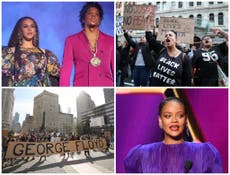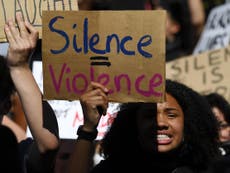The institutions that keep racism alive cannot be stopped by firing one or two ‘bad apples’
This is a subtle, pernicious and pervasive beast. We see individual incidents highlighted on social media and the news but the root cause is less often discussed

The antisocial dog walker in New York’s Central Park who threatened to call the police on an African American bird watcher after he politely asked her to comply with a “keep dogs on leads” ordinance has been relegated to footnote status given what’s happened since.
That’s a pity, because there are lessons to be learned from the incident, and especially the reaction to it.
Amy Cooper paid a price for her obnoxious behaviour, her attempt to use the very real fear of the police bird watcher Christian Cooper may have felt as an African American at the prospect of their intervention.
As a result of her actions, Amy Cooper, an insurance portfolio manager for Franklin Templeton, a financial services outfit, quickly found herself pitched into one of the chilliest American jobs markets since the great depression.
“Following our internal review of the incident in Central Park yesterday, we have made the decision to terminate the employee involved, effective immediately. We do not tolerate racism of any kind at Franklin Templeton,” the company piously declared.
In the process, it washed its hands of the matter. We've got rid of the bad apple, now move along. Nothing to see here until the next quarterly earnings statement is due.
Is that really acceptable?
It is not.
Take a look at Franklin Templeton as an example and you’ll see part of the reason why the American dream has become a nightmare for those who aren’t included in it because of colour.
Of the 17 directors and officers listed on its website, 15 are white, none are African American.
Work hard, and you can get ahead, so the mantra goes.
From what you can see on the website, it seems as though the best way of getting ahead at Franklin Templeton, a public company listed on the New York Stock Exchange, is through being a member of the founding Johnson family.
But there are problems at companies where you can’t as easily get a lift from your family ties too.
Get your degree from a fancy and expensive university, do the rounds on Wall Street, or one of the big professional services firms, and network with the right people. That’s your best bet if you want to get ahead in corporate America.
It’s a pathway that excludes too many, especially those from minority backgrounds.
The big fuss made of the exceptions, sometimes they even become the subject of movies, only services to highlight how very unusual they are.
What’s this got to do with the fires lit across America’s great cities over the killing of the unarmed, handcuffed George Floyd by a Minneapolis police officer who knelt on his neck while he was suffocating? They’re fuelled by institutional racism too.
While we see individual incidences of racist behaviour filmed and highlighted on social media and being reported in the news, the root cause is less often discussed.
That holds true in America’s great companies and its political institutions as well as its police forces. It can be subtler with the former. They hire or pass over minorities as opposed to killing them.
But it all feeds into a toxic mix.
The most obvious, glaring example, can be seen in the NFL, America’s premier sports league that is 70 per cent African American on the (mostly) meritocratic field of play but has just four minority head coaches and has refused to hire a perfectly good quarterback for protesting police brutality. You may have heard of him. His name is Colin Kaepernick.
Institutional racism is subtle, pernicious and pervasive.
You don’t see it on film. If it's not happening to you, you may only see it at work in statistics, or in the monochrome nature of the pictures at the top of the little biographies of corporate titans who say they don’t tolerate racism in their annual reports.
Tackling institutional racism is hard, not least because it typically isn’t even recognised as such, because just using the word will get you a snotty “how dare you” from the public relations shills hired by any organisation you might use the word in connection with.
“We abhor racism,” is what they’ll say. Yeah, yeah.
Tackling it is tough and unlikely to yield the sort of results politicians like to point to when they come up for re-election, at least not quickly. It doesn’t tend to impress their donors, because they’re often part of the problem.
This is why the scenes that have filled the world’s TV screens in recent days from a country that still likes to describe itself as the “leader of the free world”, will be probably repeated.






Join our commenting forum
Join thought-provoking conversations, follow other Independent readers and see their replies